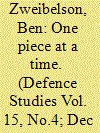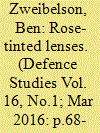|
|
|
Sort Order |
|
|
|
Items / Page
|
|
|
|
|
|
|
| Srl | Item |
| 1 |
ID:
159187


|
|
|
|
|
| Summary/Abstract |
Military reading lists, intended to promote professional reading and in turn enhance education and develop critical thinking skills and sound judgement, recommend key texts to military personnel. This is a noble intent but the lists themselves, while generally good, are not flawless. Critiques of military reading lists often focus on what sources they are missing. This article offers its own critique but from a different perspective. It does so by analysing why some sources, which have become outdated, are based on faulty or incomplete research, have been thoroughly disproven, or some combination of the above, nevertheless linger on military reading lists. It then offers a short list of such sources, which it recommends be either removed from existing reading lists or accompanied by other sources that place the original source in appropriate historical context. Where applicable, it also recommends alternative sources that provide insights into the same subject matter. In so doing, this article is intended generate debate and to assist militaries to achieve a better balance between evaluation, induction and retention of valid knowledge on one hand, and rejection of outdated or flawed knowledge on the other.
|
|
|
|
|
|
|
|
|
|
|
|
|
|
|
|
| 2 |
ID:
142260


|
|
|
|
|
| Summary/Abstract |
The recent strategic failures in Iraq and Afghanistan for military coalitions illustrate that we have significant problems with understanding how and why we plan military campaigns in ways that over time demonstrate ineffectiveness and confusion. Arguably, we may not realize why we construct insufficient campaign plans because we are not even aware of our cognitive behaviors. This article critically charges that our entire approach to understanding conflict and our subsequent military planning methodologies stem from highly limited yet deeply cherished conceptual models that operate behind the scenes. We hardly realize them, yet they dominate our very understanding of how we imagine the world functions. With military campaign plans, our centralized hierarchies, linear causality reasoning, and other significant sociological forces send us into cycles of poor planning along with institutional blinders that resist critical reflection on why we are failing.
|
|
|
|
|
|
|
|
|
|
|
|
|
|
|
|
| 3 |
ID:
143611


|
|
|
|
|
| Summary/Abstract |
Strategists and military professionals have previously questioned many of the methodological (theoretical underpinnings, the principles, and rules applied by the discipline) decisions associated with American military strategy, but the direction this essay takes is above and beyond the common methodological rivalries in how we pursue strategic desired future states. To get beyond methodological disputes entirely, we must consider thinking about our thinking as an organization on American strategy. Thus, this article hovers between philosophies, organizational theory, as well as our usually unquestioned belief in something called “strategy”. Questioning things about our basic understanding of the world tends to trigger strong organizational defense mechanisms, for good reason. Critical reflection at deep levels puts our worldview, and our role within it at stake. Nonetheless, as strategic disappointment emerges over multiple complex conflict developments, even the most cherished and guarded choices on how the world ought to work are ripe for critical inquiry. This essay examines the limited single strategic paradigm of the US defense industry and how the latest American National Security Strategy and Army Future Operating Concept (Win in a Complex World through 2030) presents a flawed strategic position. This essay presents valid alternative strategies that operate within different paradigmatic constructs.
|
|
|
|
|
|
|
|
|
|
|
|
|
|
|
|
|
|
|
|
|